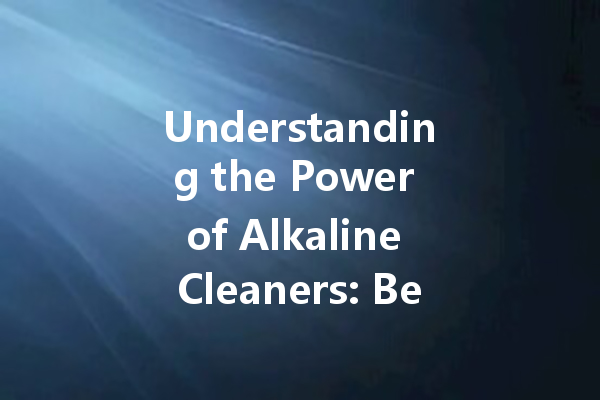Alkaline cleaners are some of the most effective cleaning agents on the market today. Their ability to break down grease, oils, and organic materials makes them highly sought after in various industries and households. This article will explore the benefits, uses, and best practices for employing alkaline cleaners effectively.
What Are Alkaline Cleaners?
Alkaline cleaners are cleaning solutions with a pH level greater than 7, making them basic or alkaline. They contain ingredients such as sodium hydroxide, potassium hydroxide, and other surfactants that help lift dirt and grime from surfaces. These cleaners are especially effective against fats and oil, which is why they are commonly used in kitchens, automotive applications, and industrial cleaning.
Benefits of Alkaline Cleaners
One of the primary advantages of alkaline cleaners is their capability to tackle tough grease and grime. This is particularly beneficial in kitchen environments where cooking oils can accumulate on surfaces, making them difficult to clean with regular soap and water.
Alkaline cleaners can be used in a variety of settings, from residential kitchens to industrial manufacturing facilities. They are suitable for cleaning metal surfaces, machinery, and even concrete floors, highlighting their versatility as a cleaning agent.
Many alkaline cleaners are formulated with biodegradable materials, making them an eco-friendly alternative to harsher chemical cleaners. Users can have peace of mind knowing that they are not compromising the environment while achieving effective cleaning results.
Common Uses of Alkaline Cleaners
In both commercial and residential kitchens, alkaline cleaners are often the go-to choice for cleaning stovetops, ovens, and grills. Their grease-cutting power ensures that kitchens remain sanitary and free of buildup.

Industries that involve heavy machinery and equipment utilize alkaline cleaners for maintenance and safety. Regular cleaning helps to maintain operational efficiency and prolong the lifespan of equipment.
Alkaline cleaners are effective in removing oxidation and rust from metal surfaces. This property makes them valuable in automotive repair shops and metalworking industries, where cleanliness can affect both aesthetics and functionality.
Best Practices for Using Alkaline Cleaners
While alkaline cleaners are powerful, they must be diluted according to manufacturer instructions for safety and effectiveness. Always adhere to recommended dilution ratios to avoid damaging surfaces or causing skin irritation.
Before applying an alkaline limpiador to a large area, it’s wise to test it on a small, inconspicuous spot. This can help determine whether the cleaner may cause damage or discoloration to the surface.
When handling alkaline cleaners, always wear appropriate personal protective equipment (PPE), such as gloves and safety goggles. This will help protect your skin and eyes from potential irritation or injury.
After using an alkaline cleaner, thoroughly rinse the cleaned surface with water. This step is crucial to ensure that no residual cleaner remains, which could lead to surface damage or skin irritation over time.
Conclusión
Alkaline cleaners are powerful tools in the cleaning arsenal, excelling at removing stubborn grease, grime, and other organic materials. Their versatility and effectiveness make them an essential choice in various applications, from kitchens to industrial settings. By understanding the benefits and best practices associated with alkaline cleaners, users can harness their cleaning power safely and effectively. Remember to always follow manufacturer guidelines and safety precautions to achieve the best results!
